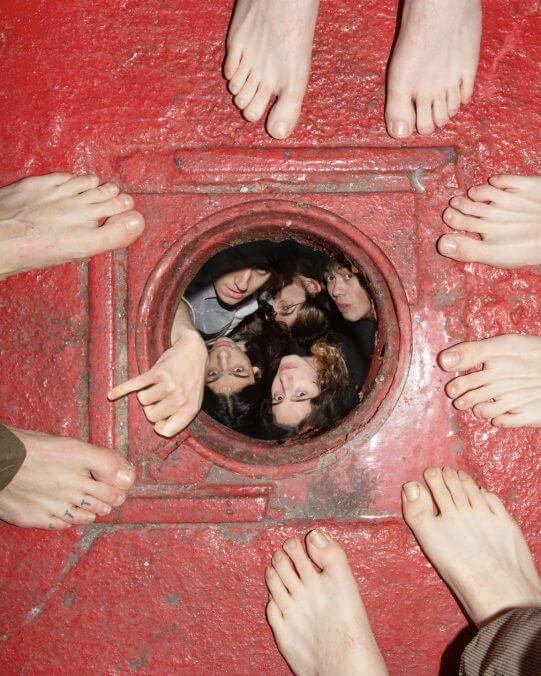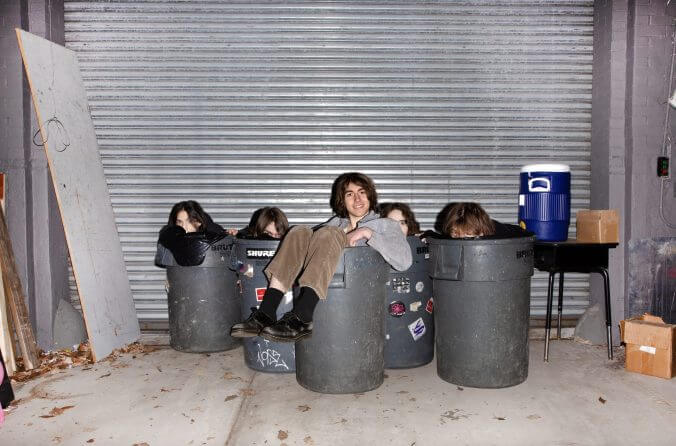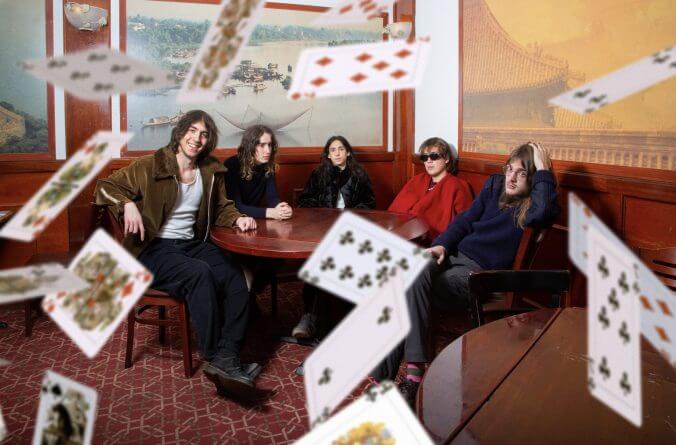COVER STORY | Geese Aren’t Here to Save Rock ‘N’ Roll
Vocalist Cameron Winter and guitarist Gus Green talk 3D Country, rock magazines manufacturing music scenes and how the band made a satirical album in the wake of ecological and social collapse
Photos by Kyle Berger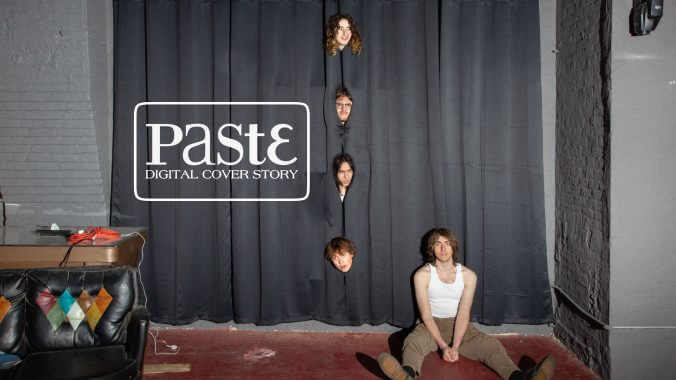
Just a few days before I hop on a call with some members of Geese, the Brooklyn rock quintet played a set at Maker Park Radio’s six-year anniversary festival on Staten Island. After their raucous performance, prolific singer/songwriter Kevin Devine took to the stage with his acoustic guitar to deliver solo renditions of songs from a career-spanning setlist. That sort of sonic whiplash makes for a puzzling booking decision, though Devine was quick to liken the back-to-back, far-ranging spectrum of volumes to Jimi Hendrix and Leonard Cohen sharing a lineup card at the Isle of Wight Festival in 1970. “It’s an interesting comparison, because we’re so much better than Jimi Hendrix and he’s so much better than Leonard Cohen,” vocalist Cameron Winter quips from a choppy Zoom screen, as he walks around New York. “Apples and oranges.” With the momentum that Geese has gained over the last few years—especially with their brand new, sophomore album 3D Country—it’s hard to argue with the generations-spanning parallels of brazen, ambitious and chaotic rock ‘n’ roll. They’re not quite Hendrix yet, but they are the most exciting young band in America.
Geese are a five-piece who met while they were attending Brooklyn Friends School and Little Red School House in NYC back in the late-2010s. In those days, the band would convene in drummer Max Bassin’s basement to practice and demo. Once senior year ended, the quintet had planned to call it a day and head off to college. Guitarist Gus Green was set to go to Oberlin College in Ohio, while other members had received admission to the Berklee College of Music in Boston. But, when Partisan Records entered the fold and signed them to their roster, everything changed. Joining a label that’s been responsible for great albums by acts like IDLES, Fontaines D.C. and PJ Harvey was no small feat, and it greatly changed the trajectory for Winter, Dominic DiGesu, Bassin, Green and Foster Hudson.
Teaming up with Partisan signaled a great shift in Geese’s destiny, but it happened at a time when COVID was at an apex and unraveling in America. All five members graduated high school into a remote world, and it wasn’t easy to balance both changes while barely in adulthood. “I was totally freaked out by this unprecedented thing that was happening, and then there was this other unprecedented thing in my life that was happening, which was [the record deal]. It was really wacky,” Green says. Pre-pandemic, graduates who opted to skip college and avoid going into debt were looked down on, as if bypassing that chapter of your life was some taboo, irredeemable choice. Green takes classes part-time, but their main focus is on Geese. And, now that the band are two albums in and firmly in the groove, I ask them and Winter if passing on college was the right choice.
“Yeah, I would actually say so,” Green says. “Pretty confidently. There was one year—the first year of the pandemic—where we were still finishing up [Projector] and planning shows, nothing was really happening, public-facing-wise. It felt a little bit weird, at that point. But we have since gotten very busy.” “Definitely,” Winter chimes in. “I was really scared. A lot of what was holding me back from making a decision not to go to school is how few people make that decision at this point. It’s a real game of chicken. I think, a lot of the time, whether you’re gonna go to school or not—even if you don’t really care or see a point in it—it’s supposed to be the place where you find yourself. But I’ve been finding myself pretty well, not going to school—so it’s working for me. It wouldn’t work for everyone, but we’re very lucky.”
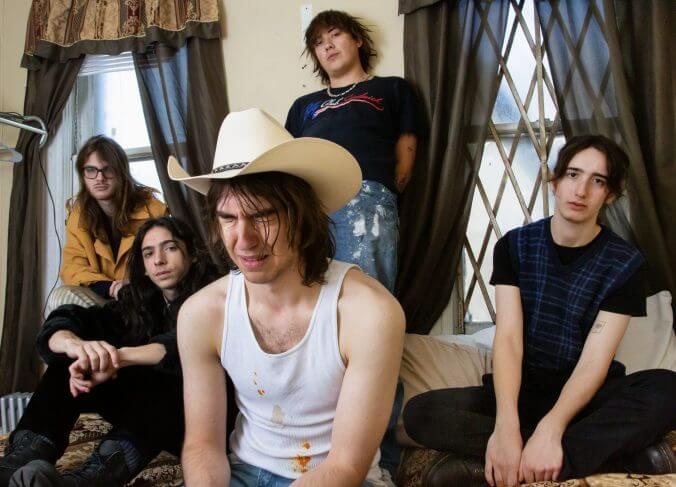
[Credit: Kyle Berger]
Geese’s first album, Projector, was self-produced and then mixed by Dan Carey—an English engineer who’s helmed records by everyone from Wet Leg to Fontaines D.C. to Squid to black midi. The project arrived with a lot of hype, as Geese were quickly touted as rock saviors when many of the members were still teenagers. Like the bands Carey has worked with over the last 10 years, the Brooklynites brought a sporadic, experimental and bold palette of work to the table and got to embellish it. Known for shape-shifting between sub-genres, Projector put Geese in a wheelhouse they could thrive in. Their first-ever single, “Disco,” was a seven-minute odyssey that presented the band as risk-takers who weren’t afraid to throw caution to the wind and drop a track of such an epic length fresh out of the gate. But, Winter quickly reveals that they’d initially wanted to put out “Low Era” first. “We opened it with a more-expansive track to hook the people who like that in and then tighten up for the second go-around,” Green says. “Which is, I guess, the opposite of what we did this time around.”
They’re right. This time around, Geese kick-started the hype for 3D Country with “Cowboy Nudes,” a sub-three-minute, dazzling track that has the milieu of some great, cosmic, honky-tonk paradise. “I wish that the end coulda come a little sooner,” Winter croons. “We’ve been looking for a chance to be alone.” Later, “3D Country” arrives at five-odd minutes and finds Winter coiling his vocals around a blues riff that obliterates cowboy chord expectations. When those first two singles arrived earlier this year, you could, immediately, sense an uptick in production for the band. Going from the DIY fixtures of Bassin’s basement to a studio was bound to change the alchemy of what Geese would become. “We definitely did a lot more pre-production for [3D Country], there wasn’t really much of that at all for Projector,” Green says. “We had more resources and it was like kids in a candy store. We wanted to use all of the cool studio gizmos and make something that we’ve always wanted to but haven’t necessarily had the means to—until now.”
Longtime Arctic Monkeys producer James Ford helmed the boards on 3D Country, as Geese’s album is now sandwiched in-between his production credits on Depeche Mode’s Memento Mori and Blur’s The Ballad of Darren. Despite having a (mostly) maximal pop background, Ford has been known to make a foray into the weird stuff here and there, making him an optimal surveyor to have on the project. 3D Country was, as Green puts it, “very well-contextualized in [Ford’s] hands” and the English engineer was able to help Geese bring the disparate demos to a cohesive, filled-out shape by encouraging extra takes and pushing the band towards weird margins they might not have flirted with on their own. “I think we needed an adult presence in the room with us, just a grounding, British sort of ‘I know what I’m doing’ presence,” Winter adds.
3D Country sounds great, and Geese glossed a million-dollar attitude across the album’s unpredictable tracklist. As indebted to the various architectures of rock ‘n’ roll as their sophomore effort is, it’s also, in many ways, an antithesis to what’s working in indie spheres and the mainstream. It’s unlikely that one of their tracks blows up on TikTok anytime soon, but they don’t give a fuck about that. “A lot of what we’re trying to do, I think, with [3D Country], is to be contradictory to everything that is succeeding in rock right now, for better or for worse,” Winter says. “There’s a lot of seriousness in a lot of rock music. It’s almost, like, dance-y. It’s almost like rap, the talking, singing and the very straightforward rhythms. There’s a lot of post-punk stuff out right now. And we just desperately wanted to oppose that—not because it’s terrible or anything. It’s fine. We wanted to be unique little snowflakes.”
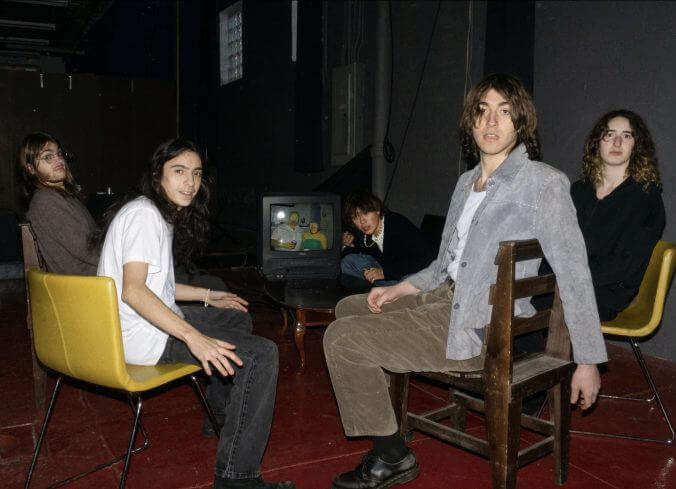
[Credit: Kyle Berger]
Geese look to bands that break away from traditional setups and expectations. Green opens their streaming library and calls out acts like caroline and Home Is Where as immediate, recent reference points, while Winter takes an opportunity to vent about the state of rock ‘n’ roll, the genre’s inclinations to retread worn-out roads and how journalism attempts to rekindle the flames of bygone scenes. “It almost makes us uncomfortable, sometimes, with how, occasionally, a rock publication will bring us up [in conversations about] ‘Who will save New York rock ‘n’ roll?’ New York rock ‘n’ roll, it doesn’t exist anymore. Rock as an expression of New York, or even as youth, is so dwindling. It’s taking form in ways that aren’t actually rock music.”
-

-

-

-

-

-

-

-

-

-

-

-

-

-

-

-

-

-

-

-

-

-

-

-

-

-

-

-

-

-

-

-

-

-

-

-

-

-

-

-

